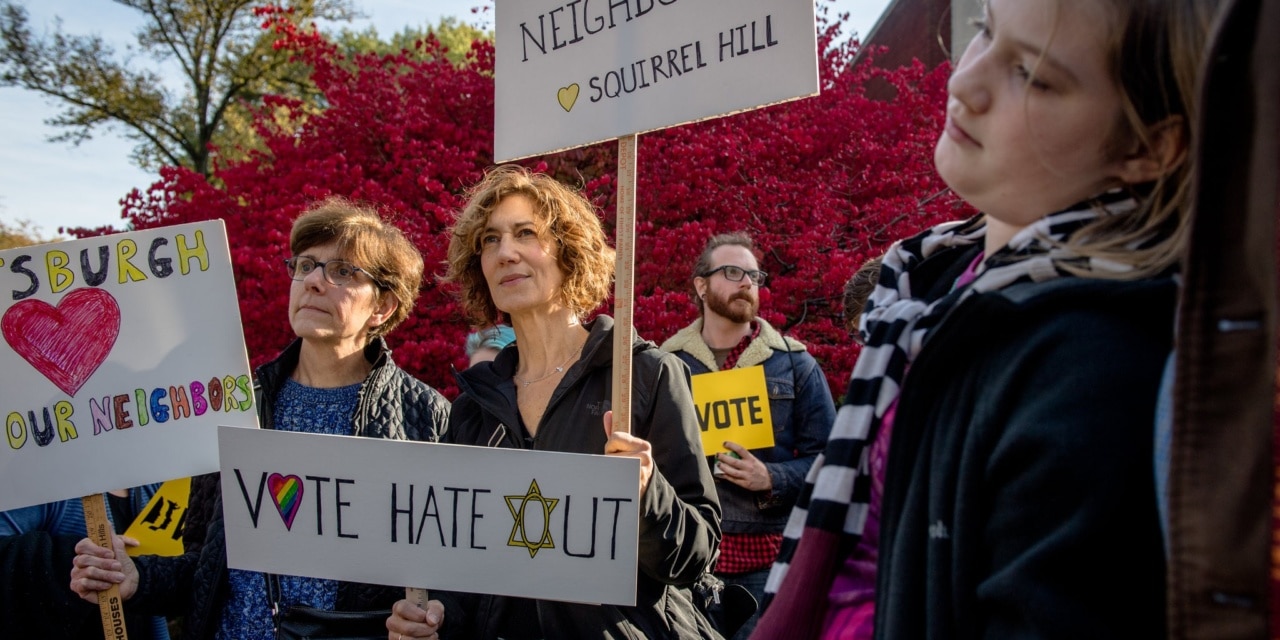A gathering near the Tree of Life synagogue, Pittsburgh, Pennsylvania, October 30, 2018 (Hilary Swift/New York Times)
Despite objections from many people grieving a deadly attack on a synagogue, Donald Trump insists on visiting the site in Pittsburgh, Pennsylvania.
On Saturday, Robert Bowers killed 11 worshippers and wounded six at the Tree of Life synagogue in Squirrel Hill, the center of Pittsburgh’s Jewish community. One of his motives was “Jewish support” for a caravan of migrants moving from Central America through Mexico towards the US border — a line interacting with Trump’s denunciation of the caravan as an “invasion” backed by Democrats, and with Trump supporters falsely claiming that the Jewish philanthropist is funding the migrants.
While the synagogue’s rabbi and the Israeli Ambassador to the US welcomed Trump, most city officials — including the mayor — asked Trump not to come. Relatives of the victims also asked that he not disrupt the grieving, and thousands of people objected to his appearance amid his language about “nationalism” — seen by many as code for “white nationalism” — immigrants, and “globalists”, a phrase used by some conspiracy theorists to refer to Jewish public figures.
EA on BBC: From Donald Trump to Whitey Bulger
The White House tried to drum up support by calling public figures and telling them — falsely — that others had agreed to join Trump, but Congressional and local politicians still refused. In the end, local officials were given no notice of Trump’s arrival, and there was no advance public itinerary.
Trump did not speak during the three-hour trip. Instead he lit candles and laid flower at the synagogue’s vestibule, placing stones of the Stars of David placed for the 11 victims. He also visiting a hospital to see wound police officers.
Possibly because of the adverse reaction, Trump uncharacteristically did not tweet about the visit.
“The sense in the community is that they didn’t think this was a time for a political photo shoot,” said Democrat Representative Mike Doyle, whose district includes Squirrel Hill. “There are strong feelings in the community about him and the divisive nature of his rhetoric.”
Soon after the attack, the Jewish group Bend the Arc led a campaign for Trump to stay out of Pittsburgh unless he renounced “white nationalism”. Thousands of people joined the petition.
During Trump’s brief stay, protesters — some praying in Hebrew, others singing and chanting — moved around Squirrel Hill. The crowd was diverse, including college students, Orthodox Jews, and middle-aged parents pushing strollers. Signs read “Words Matter” and “President Hate is Not Welcome in our state.” The largest march began on Beechwood Boulevard, home of the iconic children’s TV figure Mr. Rogers, ending at the Presbyterian church where he used to pray.
Ardon Shorr, who helped organize one protest, noted, “These Jews were targeted specifically because they were helping refugees.” He said the visit, which occurred as funerals were taking place, were “insulting” to victims and their families.
The family of victim Daniel Stein told federal officials that they did not want to meet with Trump, citing Trump’s comments immediately after the shooting that the Tree of Life should have had an armed guard.
“It was just a worthless thing to say,” said Stein’s nephew Steven Halle. “When something tragic has happened, you don’t kick people when they are down. There should have been an apology.”
Trump supporters tried to push back with an open letter, signed by more than 40 “members of the Pittsburgh Jewish Community”, welcoming Trump and expressing “gratitude to you and your administration for your unwavering support of Israel”.

